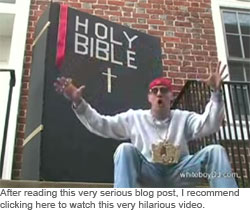Nov 16, 2007
 A recent post on CT's Liveblog reminded me of a thread I've been wanting to sound off on since Tony Campolo defended the concept of Red Letter [...]
A recent post on CT's Liveblog reminded me of a thread I've been wanting to sound off on since Tony Campolo defended the concept of Red Letter [...]
Read the Full Article

Already a subscriber? Login
 A recent post on CT's Liveblog reminded me of a thread I've been wanting to sound off on since Tony Campolo defended the concept of Red Letter [...]
A recent post on CT's Liveblog reminded me of a thread I've been wanting to sound off on since Tony Campolo defended the concept of Red Letter [...]
